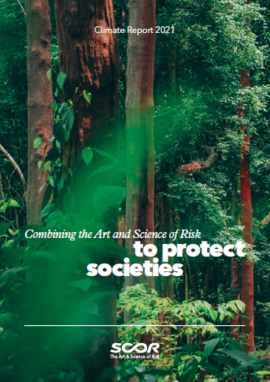Sustainability at the core of our raison d’être
SCOR announces the release of its 2021 Climate Report
June 15, 2022

Editorial by Laurent Rousseau, Chief Executive Officer
* * * * *
SCOR’s purpose, our raison d’être, is to combine the Art & Science of Risk to protect societies. We do so by sharing the fortunes of societies over the longterm, protecting insureds against the risks they face, pushing back the frontiers of insurability and acting as a responsible investor. Closing the protection gap is both an imperative, and a source of opportunities in our business, to:
- Contribute to the health of the people: accompanying people’s health and well-being, including by developing accessible health prevention.
- Contribute to the health of the planet: protecting society from extreme events, accompanying economic agents in mitigating the effects of climate change and enabling a smooth energy transition.
At SCOR, our focus is on taking concrete actions now. We do so based on reliable facts and laying the foundations of a structural shift in the way climate risks, and more generally the sustainability imperative, are managed. Actions result from our Theory of Change and intend to optimize positive impacts of our strategy: setting clear objectives for decarbonization and facilitating the transition to a low carbon economy are the maindrivers of our actions to tackle climate change and our best contribution to a Net Zero economy.
This action plan applies to three areas:
1. Our (re)insurance underwriting activities are by design part of the solutions to the effects of climate change. Having said that, we need to be proactive and continue accompanying our clients in their transition. While some of these actions may consist in exiting
- certain risks: such as new constructions of coal-fired plants’ construction, greenfield thermal coal mines, stand-alone lignite mines or plants for our single risk business
- or areas: such as Oil & Gas in Arctic National Wildlife Refuge and High Arctic or any risk infringing World Heritage sites’ protection area for our single risk business,
we remain in a syndicated business where (re)insurers all take a slice of risks. Therefore, we provide our underwriters with complete risks’ assessments grids to fully deploy the virtuous effects of insurance and risk managed behaviors, and ensure they have an influence if not a leadership stance in the broader (re)insurance underwriting business.
2. Our invested assets: SCOR manages directly or indirectly EUR 23 billion assets and is in this capacity a financing partner of the global economy. Our actions to date have focused on climate change and portfolio decarbonization and we see tremendous upside in the coming years to finance the transition to a nature-positive economy.
3. Our own operations: it might look marginal in comparison to other industries, but we need to lead by example. SCOR has a global presence, with 36 offices in the world, and 3,590 employees. SCOR had initially set-up a target of 30% carbon reduction per employee by 2021 vs 2014 on scope 1 and 2. This objective has been reached already in 2019, and in 2021, SCOR has reduced its carbon footprint per employee by 68% vs. 2014. For the year 2022, SCOR has further increased this target to reach a 35% reduction of carbon emissions on scope 1 and 2 as compared to 2014.
Taking action in the near term is an absolute requirement to mitigate the effects of climate change. But for these actions to have sustained impacts over the long-term, we need to keep investing in structural changes:
1. The biggest challenge today lies in the insufficient KPIs, and under-developed data and analytics that most insurers have on the risks they take on their balance sheet. While financial assets can be securitized and therefore standardized, the (re)insurance business is a lot more “sticky”. It sticks to the reality of physical assets, humans and their behaviors. Reinsurers have a key role to promote a more quantitative risk transfer framework where risks can be more objectively assessed and accounted for. Improving the industry Data & Analytics is the number one underlying challenge.
2. Another fundamental and structural challenge is to change the ways projects and risks are priced, factoring-in all externalities. The discount rates used to price business should be reviewed, taking into account the price of carbon, and the full impacts of human activities on their environment.
3. Behaviors generally speaking need to keep evolving and acknowledge that a “sustainable performance” is one that takes into account all stakeholders’ interests and find a balance. In this respect, this Climate Report is only one part of the actions we take at SCOR, in the broader Sustainability imperative. Bridging the Innovation Gap in the (re)insurance industry will assist in closing the Protection Gap.
These deeper, more structural actions require a joined-up, global approach. SCOR is therefore a proactive member of influential organizations, such as the Net Zero Insurance Alliance, after having joined the Net Zero Asset Owner Alliance in 2020. While all economic actors have a leadership role to play, the global wake-up call on Climate has also to be led by institutional initiatives. Insurance has long been a partner of the public power: Climate is yet another illustration of the complementarity of the public and economic spheres.
SCOR is preparing for the near future and shaping its organization and governance to better respond to the challenges ahead and centralized the Sustainability function with dedicated experts to accelerate SCOR’s journey across our businesses (Life & Health, Property & Casualty), our investments, and our own operations.
The world will need to make significant investment over the next years to finance the climate transition. This represents a significant opportunity for (re)insurers, but it requires:
- To put Sustainability at the core of the strategy to make it a priority
- To integrate Sustainability in the company’s culture to make it a common ambition
- To invest in people and build the technical expertise and underwriting knowledge to accompany our clients’ future investment in new technologies
- To innovate and design new products that can accelerate the energy transition
The 2021 edition of our Climate Report presents in detail our approach and strategy. We will continue to drive our actions with resolve and true ambition.
